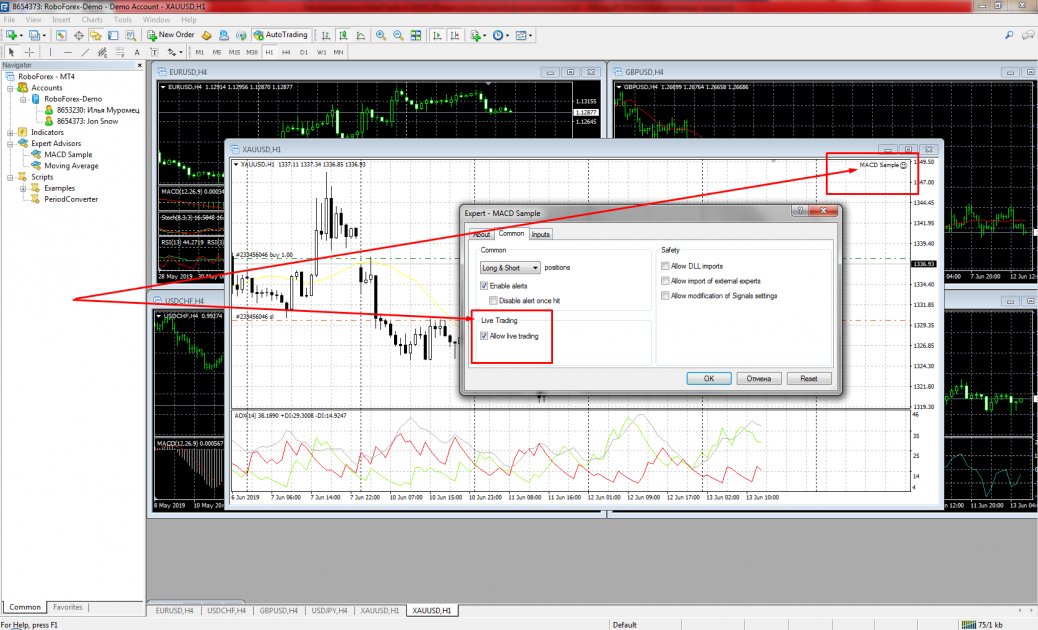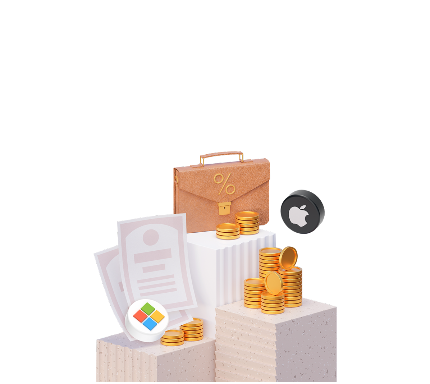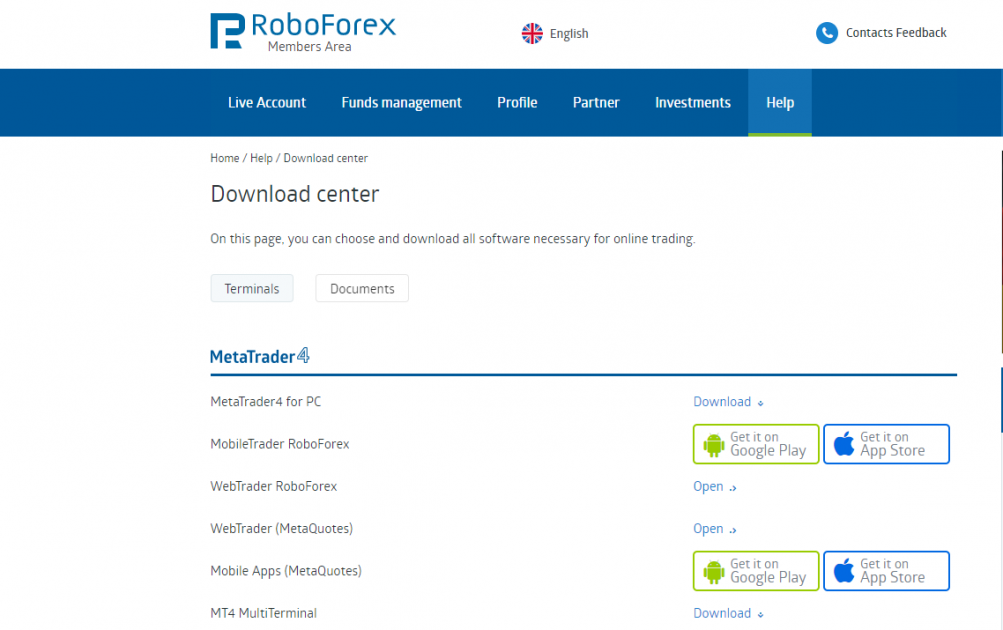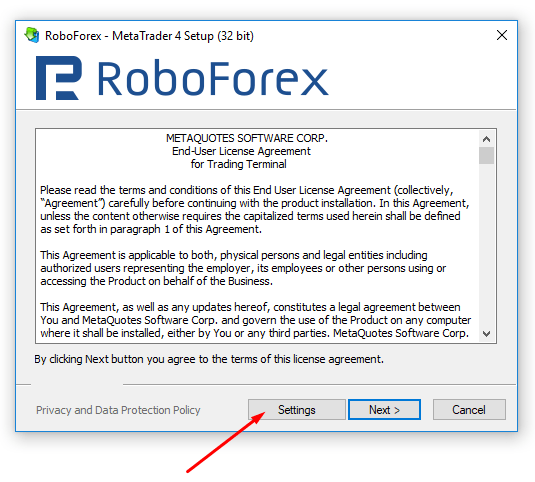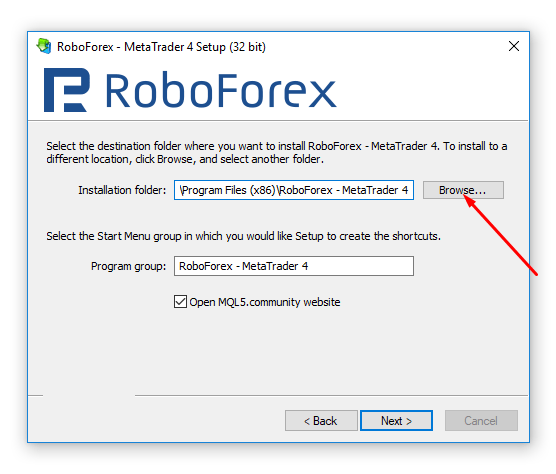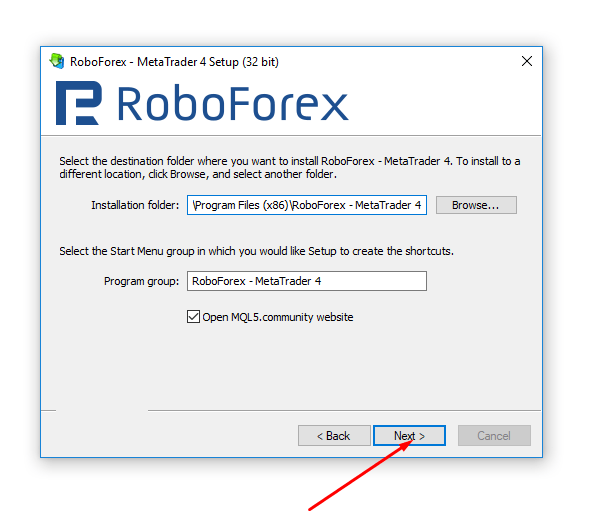How to Use MetaTrader 4 (MT4): Complete Guide for Beginners

15 minutes for reading
1. What is MetaTrader 4
An application for trading on financial markets, MetaTrader 4 was developed and is supported by MetaQuotes Software. Despite its quite deep history (released in 2005), MetaTrader 4 has been one of the most popular and actual software for traders ever since. Its recipe for success can be explained by three words, availability, simplicity, and effectiveness.
MT4 terminal is free and multi lingual (supports about 40 languages), has a user-friendly interface all necessary features for manual and automated trading. Initially, the application was intended for trading on the Forex market, but later traders started using the terminals for other assets as well, such as CFDs on stocks, indices, metals, commodities, etc. Result: an intuitive and user-friendly multi-purpose terminal, which allows to trade a wide range of instruments.
2. How to install MetaTrader 4
MetaTrader 4 can be easily installed both on a desktop computer and mobile devices, such as tablets and smartphones. The easiest way to do it is to login to your Members Area at Roboforex.com, download MetaTrader 4 setup file for free, and install it on your mobile device of PC.
After downloading the file, run it and you will see the installation wizard. First of all, click “Settings”.
Here we specify an installation folder (by default it’s C:\Program Files\RoboForex - MetaTrader 4). By clicking “Browse”, you can change it, for example chose some other partition or a hard disk drive.
After completing the previous step, click “Next” to install MetaTrader 4.
To start working in the application, you have to connect your real trading account or create a demo one (a virtual account intended for developing your trading skills). Demo accounts provide an opportunity to learn how to work with the terminal and check how efficient your approach to trading is without risks of losing your own money.
To open a demo account, go to your PMA Main Menu and proceed to Accounts — Open a new account — Demo account. A window for opening a new demo account will appear. Choose the MT4 trading platform, account type, leverage, deposit size; invent a password, and click Confirm.

As a result, a new demo account will be opened. In the window, you will see you account number (login) and password. Save them for further use. Then enter them in the MT4 terminal: File — Login to Trade Account. For ECN demo accounts, choose the RoboForex-Demo server, and for Pro demo accounts, choose RoboForex-DemoPro. Upon logging in, you can start trading.

3. Description of MetaTrader 4 basic functions
The terminal has the following basic functions located in its main menu:
- File. Here you can create new profiles and charts, and connect to trading accounts.
- View. An opportunity to customize toolbars and windows, and choose a language.
- Insert. Addition of indicators, graphics, texts.
- Charts. Customize chart parameters, manage objects, change zoom, and choose timeframes.
- Tools. New orders, quotes archive, general settings.
- Window. New windows, position of already open windows, switching between them.
- Help. User’s manual on the application and reference tools.
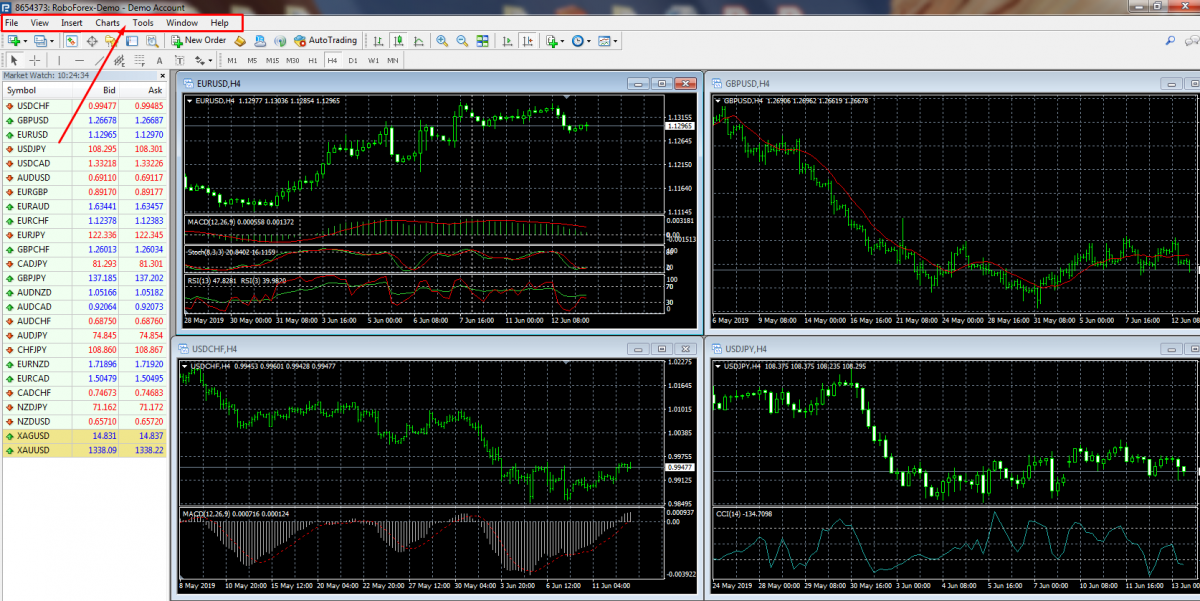
- Toolbar shows basic functions of the main menu displayed as default buttons.
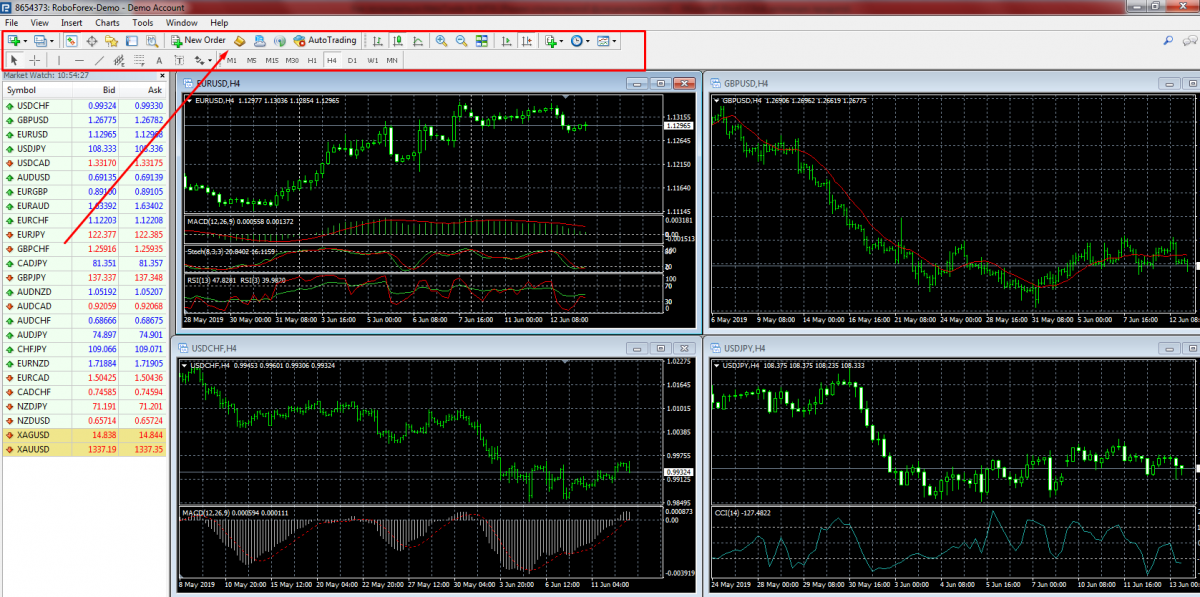
- Market Watch contains the list of financial instruments available for trading (gold and silver, CFD, currency pairs). The default view may show not all of them. To see the complete list, right-click inside the window and choose “Show all symbols” from the dropdown menu or add the required instruments manually in “Symbols” menu.
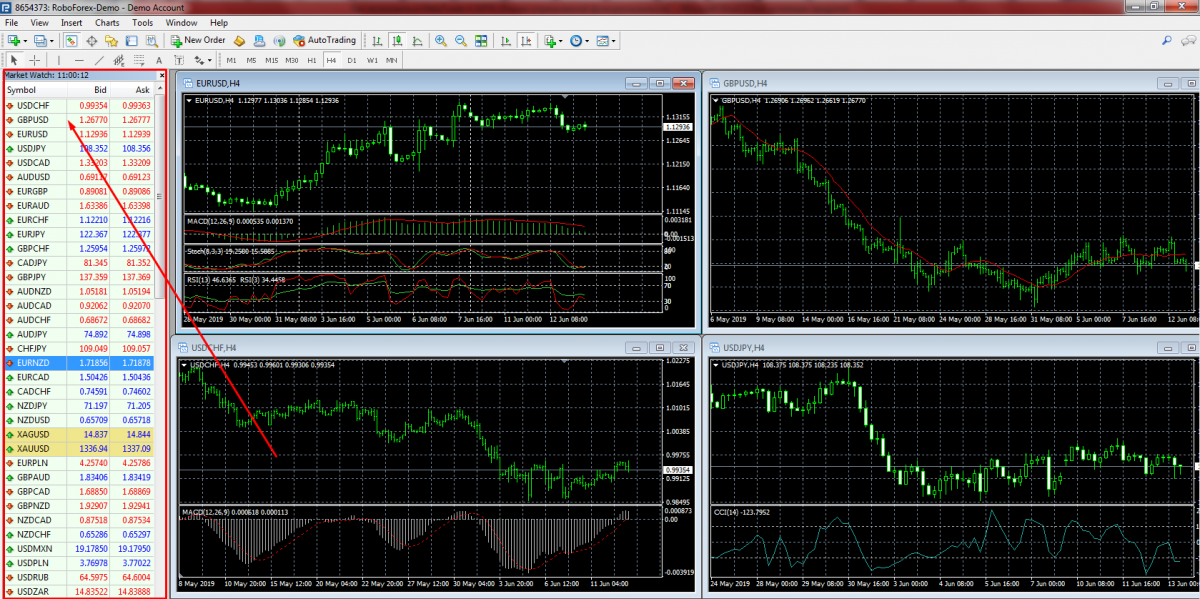
- Navigator window shows all trading accounts connected to the terminal and allows to quickly switch between them with left double-click. In addition to that, here one can drag different indicators, EAs, and scripts onto charts.
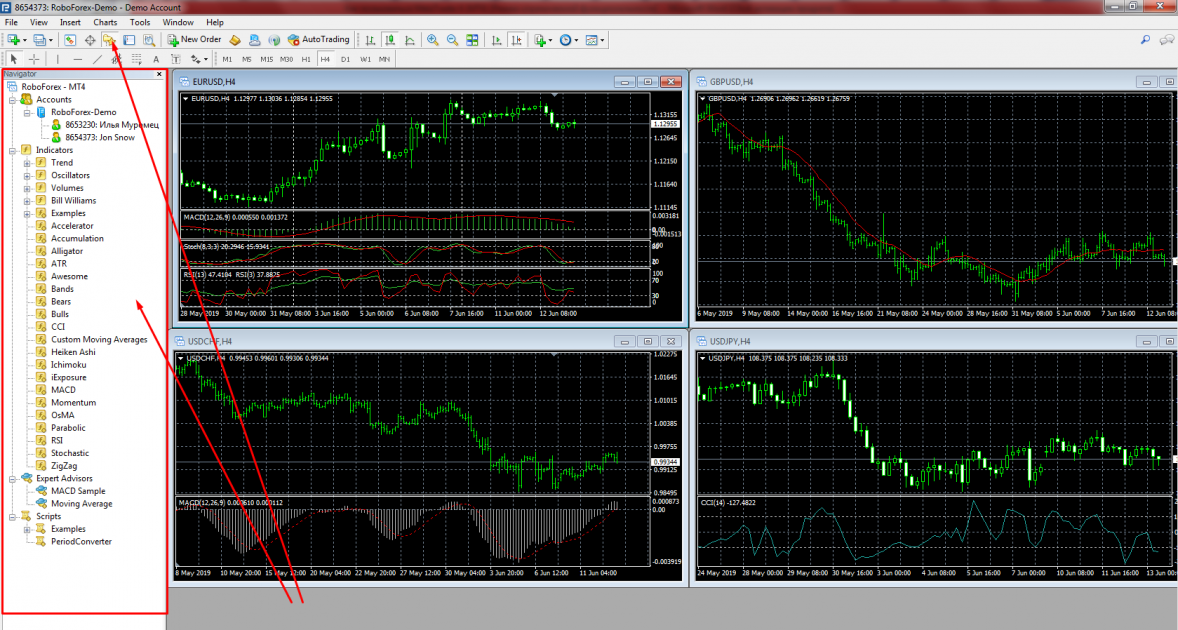
- Working area occupies the most of the screen and is intended for working with charts of financial instruments. Charts show the price dynamics online.
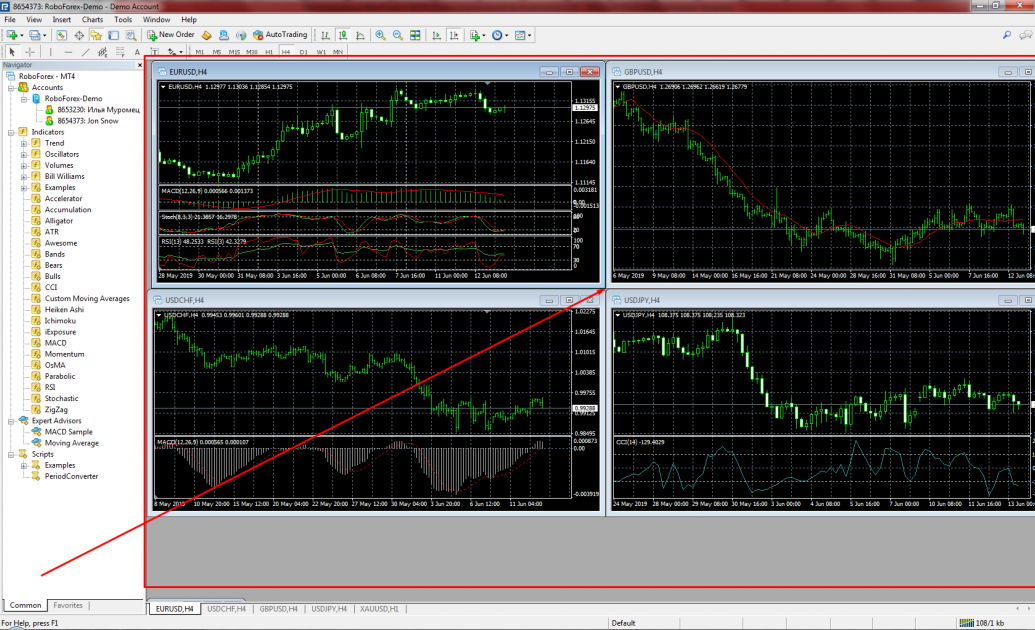
- Terminal (Trading window) is located at the bottom of the screen. “Trade” tab shows all information on the current trading account: balance, equity, and margin along with all open positions and pending orders, which may be closed, removed, or modified at any moment. Other tabs show account history, news, trading signals, etc.
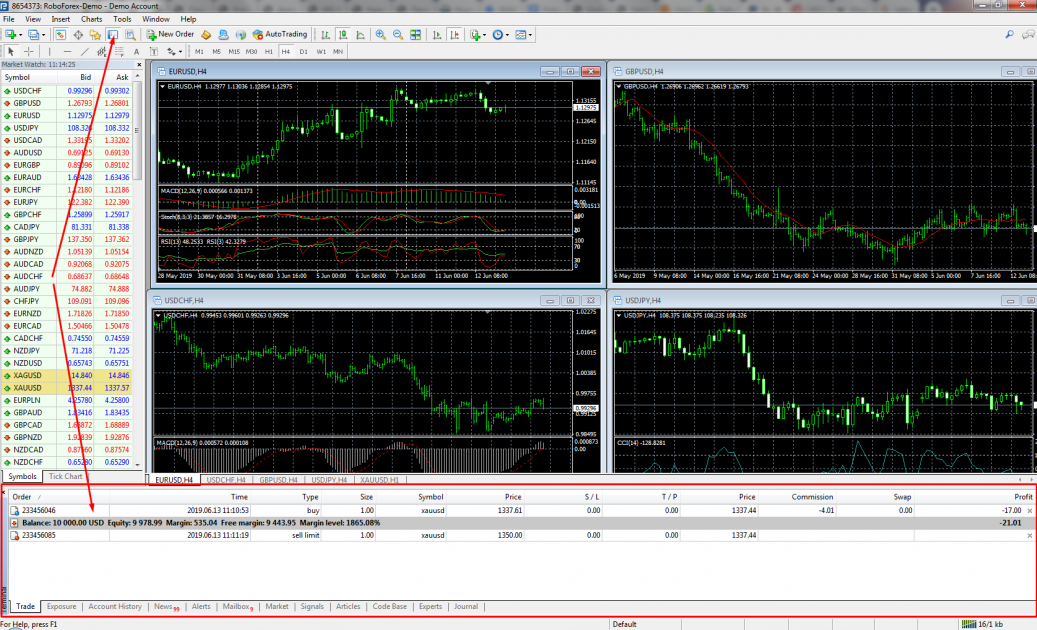
- MetaQuotes Language (MetaEditor) is a built-in programming editor for MQL4 language. It allows to create and use Expert Advisors (Robots), special software with algorithms for automated trading.
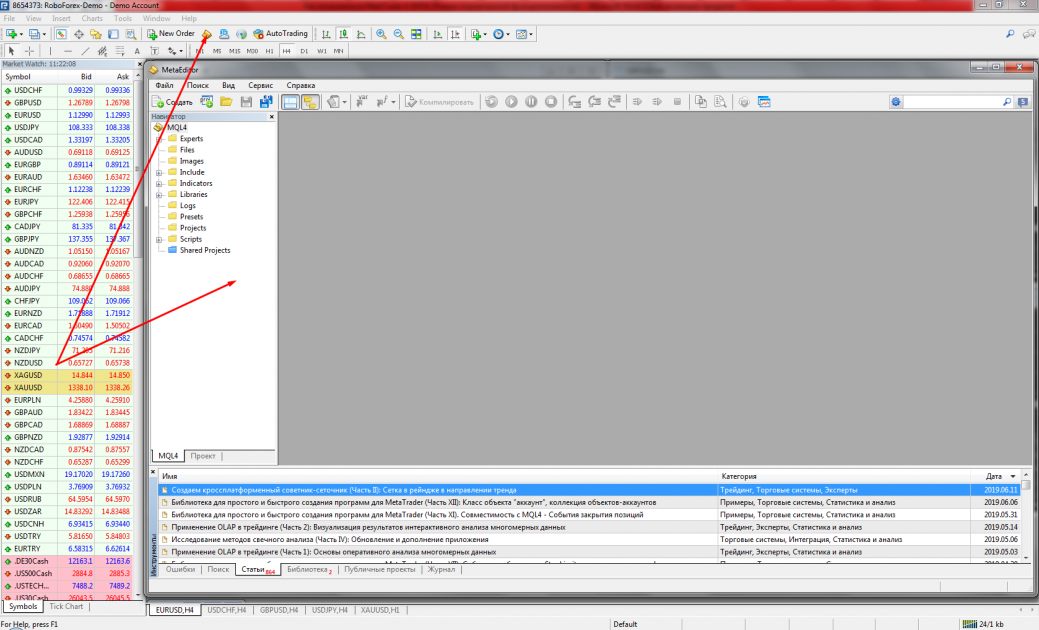
- Tester is an option for testing EAs in MetaTrader 4. It provides an opportunity to test performance and adjust EAs parameters using historic data.
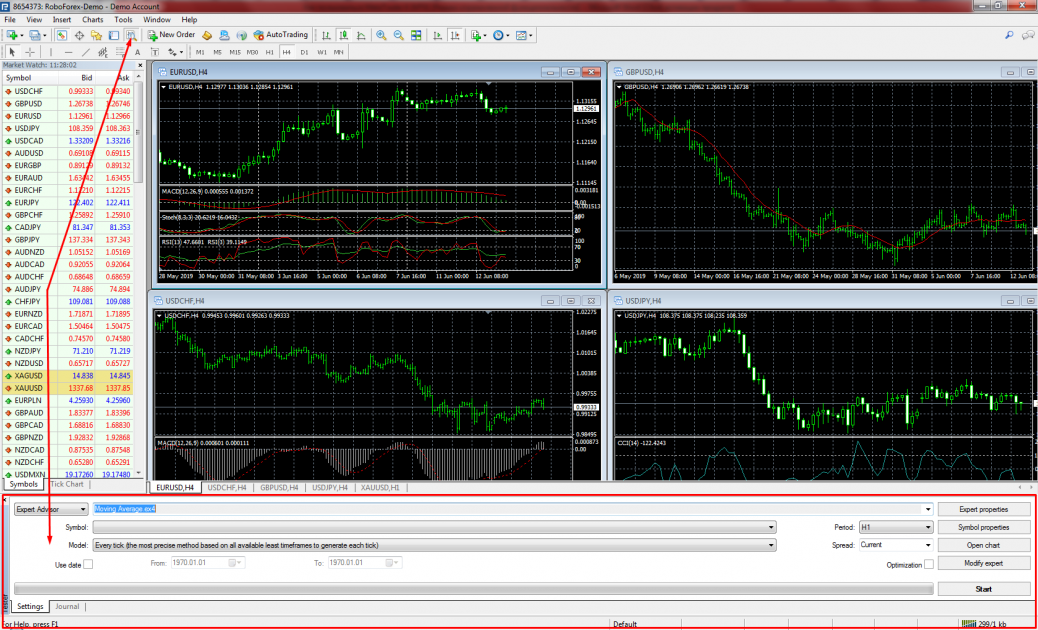
- Status bar shows the server connectivity icon, incoming and outgoing traffic, the current profile, and prices from the chart.
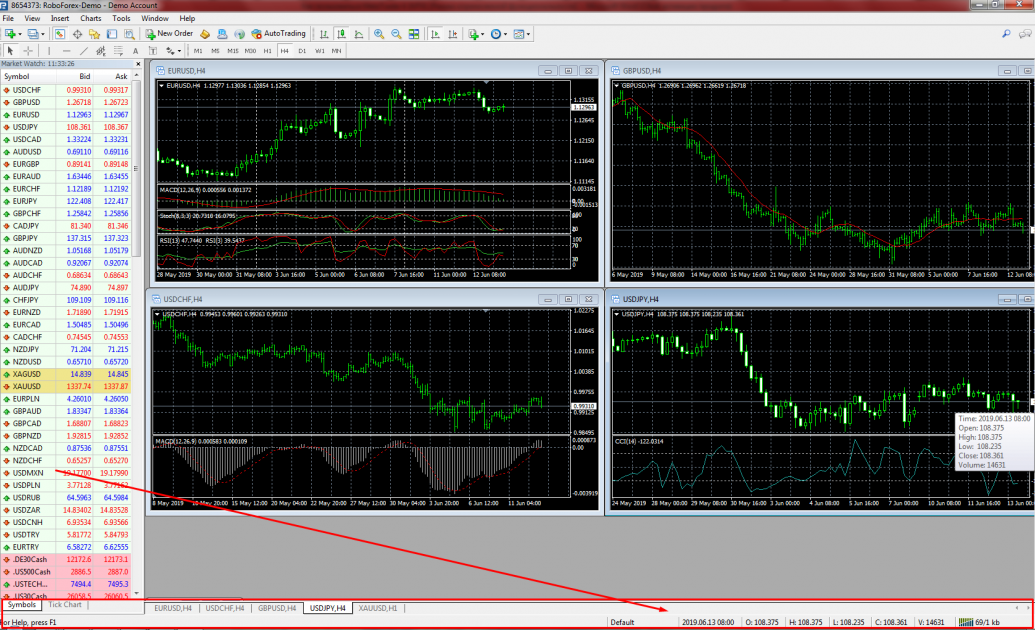
4. Chart description in MetaTrader 4
Charts in MT4 show changes in prices of different financial instruments. Using the charts, one has an opportunity to analyze movements of currency pairs and other instruments, make forecasts of price behavior. The terminal allows to open hundreds of charts at the same time, customize them, use indicators for MetaTrader 4, enable EAs, save and print charts.
Chart opening
A new chart can be opened in “File” -> “New Chart”, where later a required instrument is chosen. Another way is to use “Market Watch” window, where one drags the required symbol onto the terminal’s working area. Also, one can right-click on the required instrument and then choose “Chart window” in the appeared menu.
A new chart can be opened in “File” -> “New Chart”, where later a required instrument is chosen. Another way is to use “Market Watch” window, where one drags the required symbol onto the terminal’s working area. Also, one can right-click on the required instrument and then choose “Chart window” in the appeared menu.
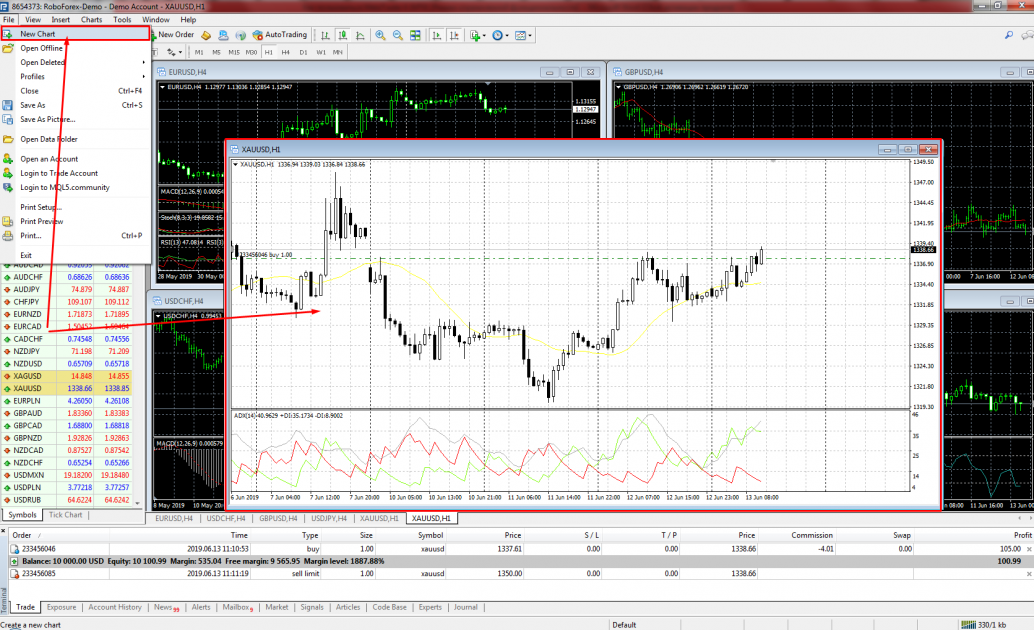
Chart customization
To customize the chart, one has to either go to “Charts” menu or right-click on the chart and choose “Properties” (F8).
- “Colors” tab. Due to one’s personal preferences, one of the three available color schemes may be chosen – “Yellow on Black”, “Green on Black”, or “Black on White”. There is an option for creating one’s own color scheme by choosing colors for all elements of the chart, such as background, text, lines, candlesticks, bars, etc. All changes in colors are displayed in a small window on the left.
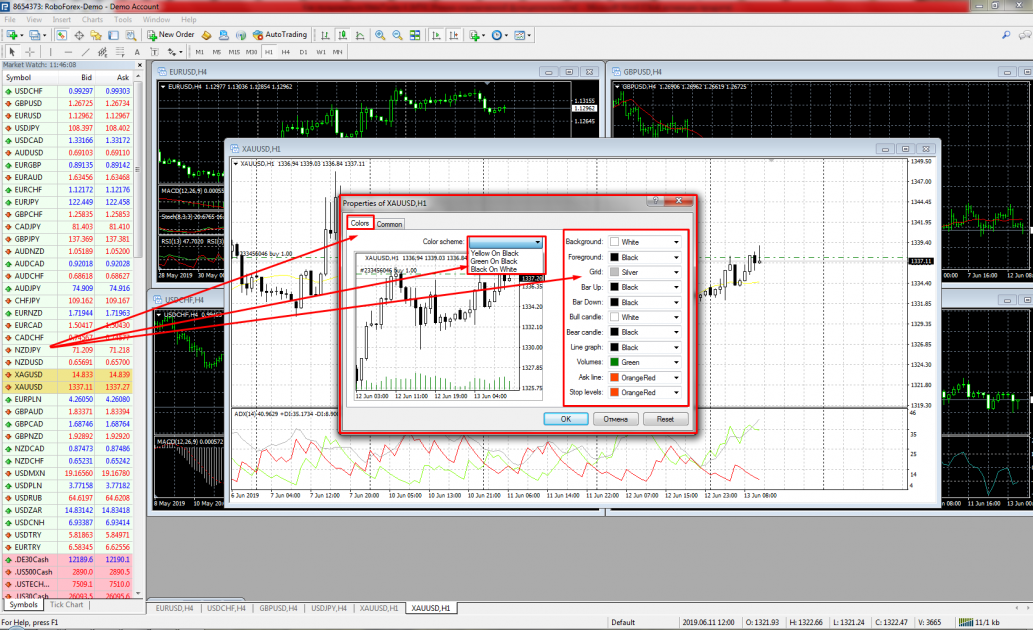
- "Common" tab helps to customize key parameters of the chart. Choose the way to display changes in the price – Japanese candlesticks, bars, or lines. Tick the parameters to be displayed on the chart: “OHLC” (Open High Low Close), “Ask line” (charts are built on Bid prices, that’s why tick this box if you need to see Ask prices), “Period separators” (vertical lines to show timeframes), “Grid” (cells with specific price values), “Volumes” (a tick volume indicator at the bottom of the chart), “Object descriptions” (describes objects on the chart), “Offline chart” (charts are opened on basis of data saved on the hard disk), “Chart on foreground” (charts are always on top of other objects), “Chart shift” (shifts the latest bar from the right screen border to the chart shift mark), “Chart autoscroll” (the current candlestick (bar) is always on the same visible place), “Scale fix” (disables automatic scaling).
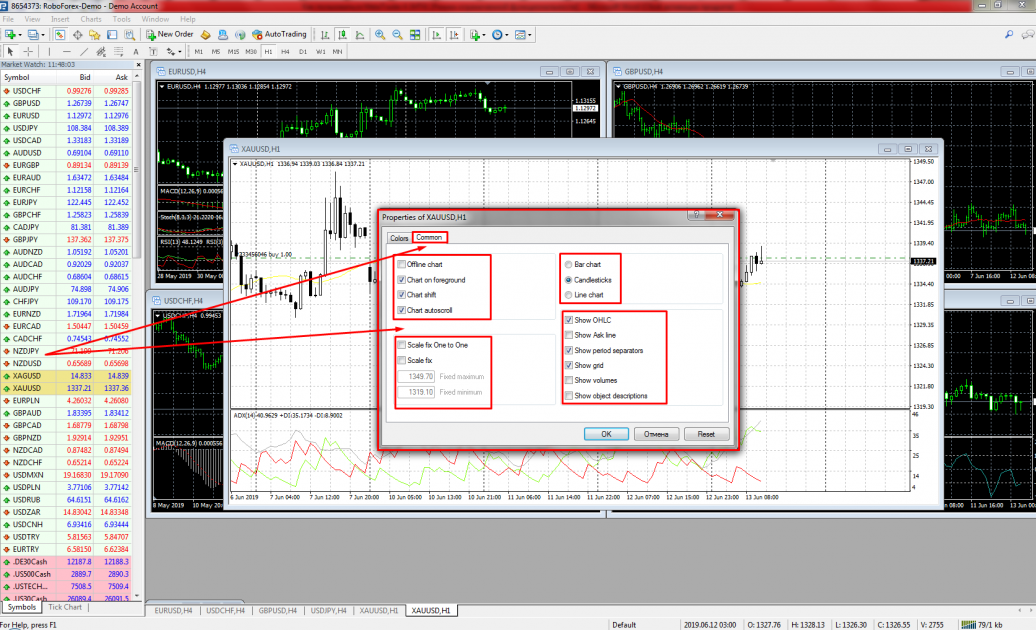
After customizing all basic parameters, one has to choose a timeframe. Using the main menu or “Toolbar”/”Navigator” menus, one can add MetaTrader 4 indicators required for analysis, such as lines, channels, Fibonacci retracements, graphic objects.
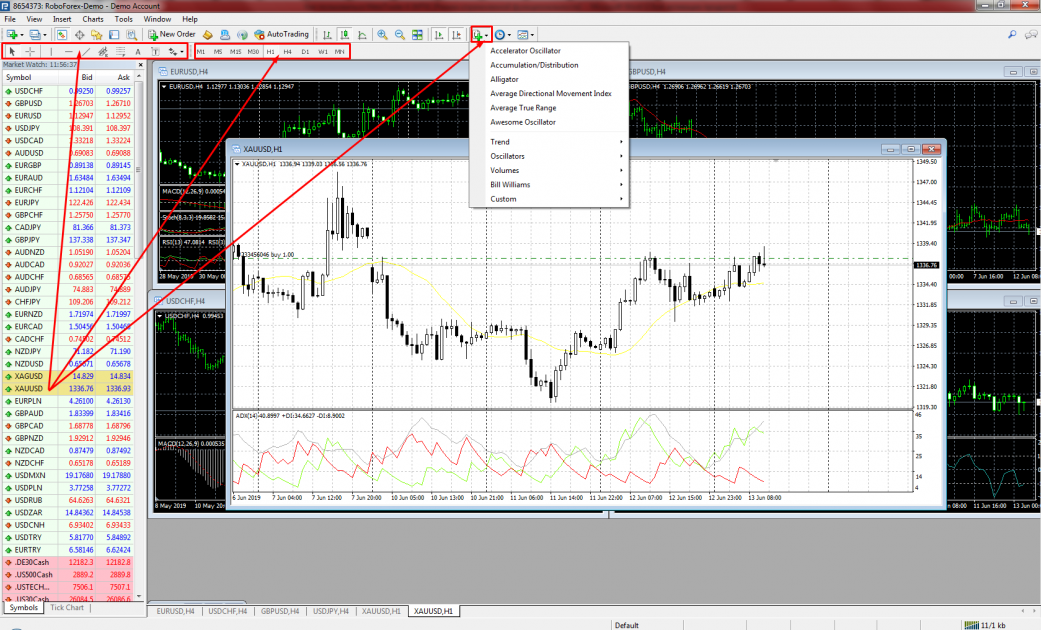
Saving charts
After customizing the chart, all changes can be saved as a template in order to apply it to all newly-opened charts. To do this, go to ”Charts” -> “Template” -> “Save template”.
The chart can also be saved in an image format. It can be done in “File” -> “Save as image”.
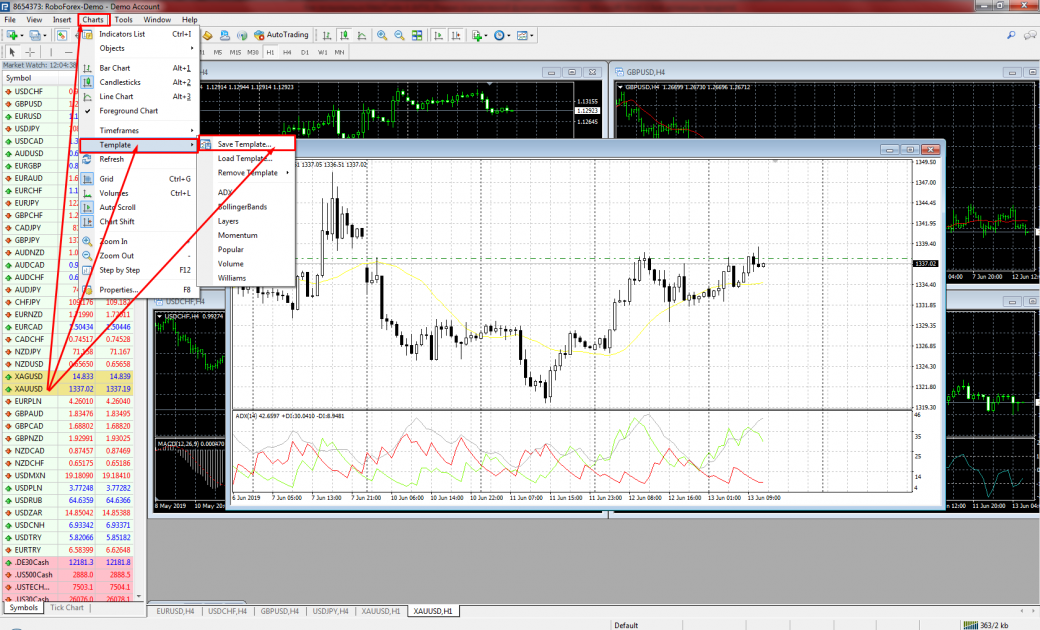
One has an opportunity to create several templates with different settings for different financial instruments. All open chart windows with your settings can be saved in “File” -> “Profiles” -> “Save as..”.
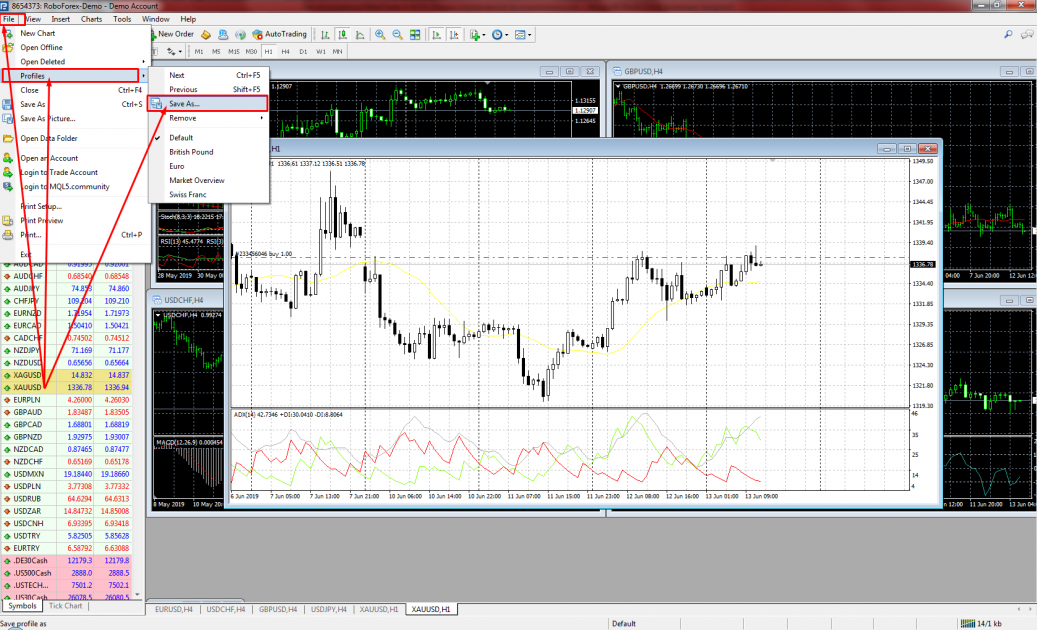
5. How to open an order in MetaTrader 4
To open a position in MetaTrader 4, go to the main menu or click “New Order” icon on the toolbar. In the newly-opened, choose the trading instrument symbol and specify the position volume. Right here, one can set Stop Loss (for limiting possible losses) and Take Profit (for taking profit) levels. By default, “Type” field offers “Market Execution” and then there are two buttons, “Sell by Market” and “Buy by Market”.
Clicking the red button (Sell by Market) opens a short position at the specified price, while clicking the blue one (Buy by Market) does the opposite – opens a long position. To place a pending order, one has to choose “Pending Order” from “Type” drawdown list.
Also, it is necessary to choose the type (Buy Limit, Buy Stop, Sell Limit, Sell Stop), specify the opening price, and, if necessary, the order expiration date. After that, click “Place order”. Your Pending order is now created and will activated as soon as the price reaches the specified price.
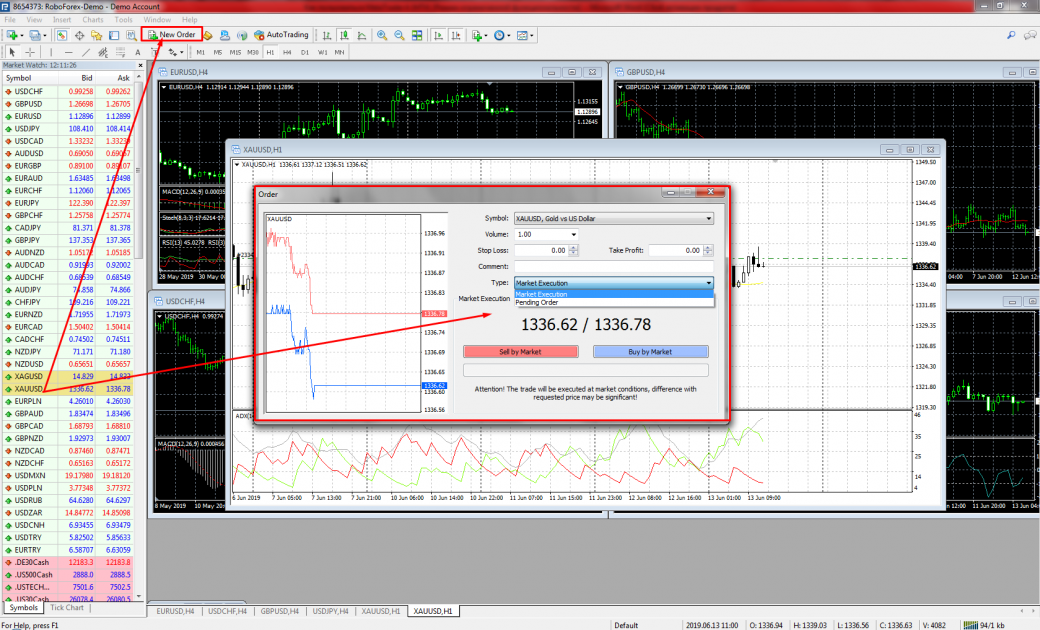
Another way to open a new order is using “One click trading” function. To do this, right-click on the chart and choose “One click trading” (Alt+T). In this window, one can quickly specify the order volume and open a buy or sell order at the current market price. “Sell” button and the current Ask is on the left, while “Buy” button and the current Bid price is on the right. Clicking one of them will open an order in the direction chosen by a trader.
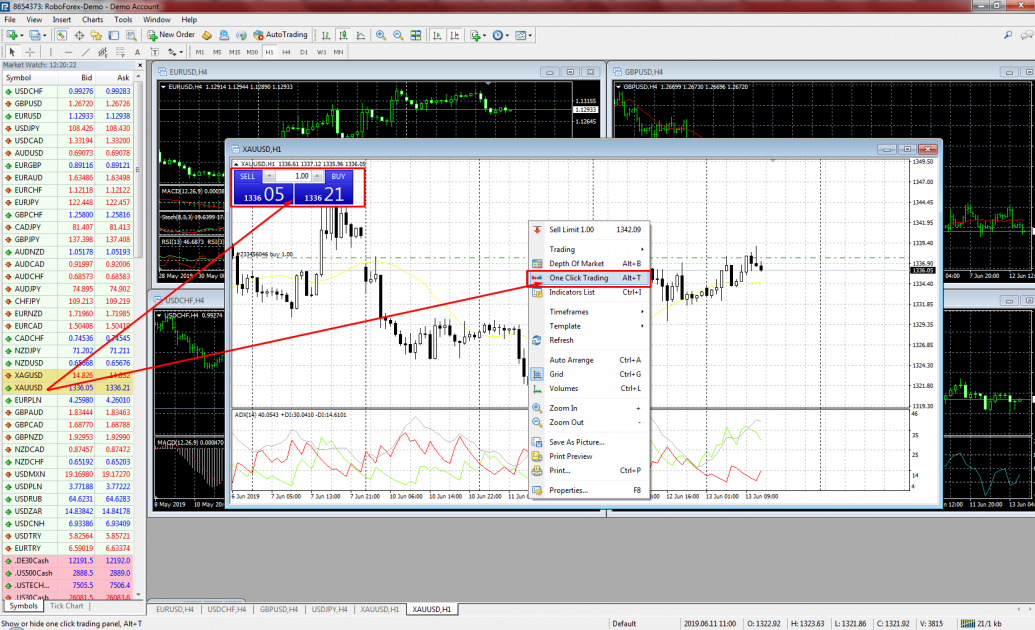
6. Order types in MetaTrader 4
Orders in MT4 can be of two types, market and pending.
Market orders
Market orders are orders to buy or sell a financial instrument at the current market price.
- Buy is an order to buy at the current market price executed at the Ask price (demand).
- Sell is and order to sell at the current market price executed at the Bid price (supply).
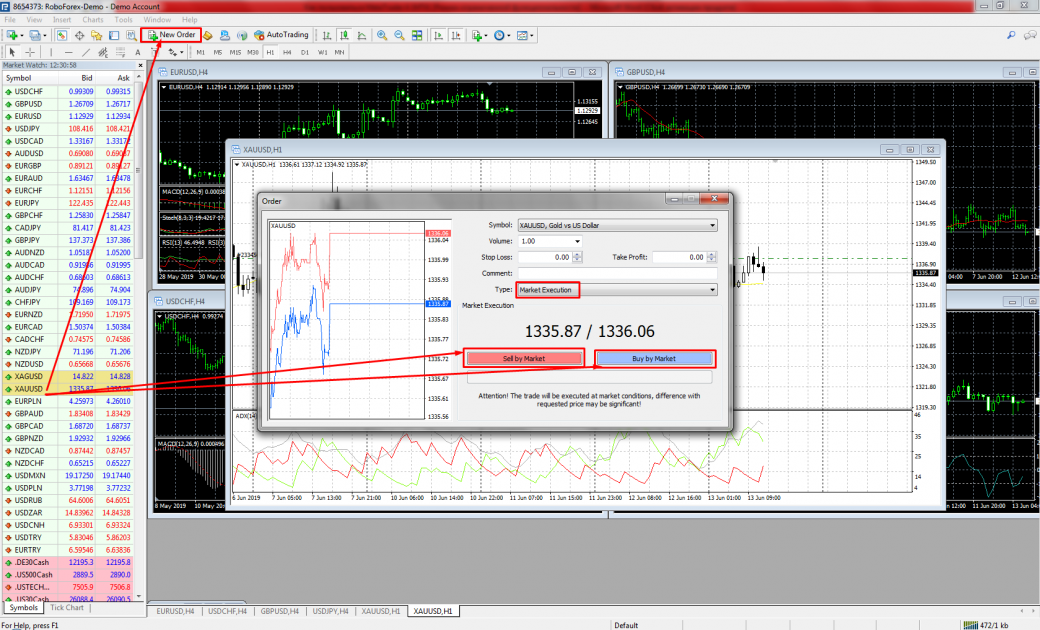
Pending orders
Pending orders are orders to buy or sell a financial instrument at the price specified in the order in advance. Such orders are activated as soon as the price of the chosen financial instrument reaches the level specified in the order:
- Buy Limit is an order to buy at the price that is below the current market price. For example, if XAU/USD is trading at 1350.00 and you want to buy it at 1300.00, place a Buy Limit order at 1300.00.
- Sell Limit is an order to sell at the price that is above the current market price. For example, if XAU/USD is trading at 1350.00 and you want to sell it at 1400.00, place a Sell Limit order at 1400.00.
- Buy Stop is an order to buy at the price that is above the current market price. For example, if XAU/USD is trading at 1350.00 and you want to buy it at 1400.00 expecting further growth, place a Buy Stop order at 1400.00.
- Sell Stop is an order to sell at the price that is below the current market price. For example, if XAU/USD is trading at 1350.00 and you want to sell it at 1300.00 expecting further decline, place a Sell Stop order at 1300.00
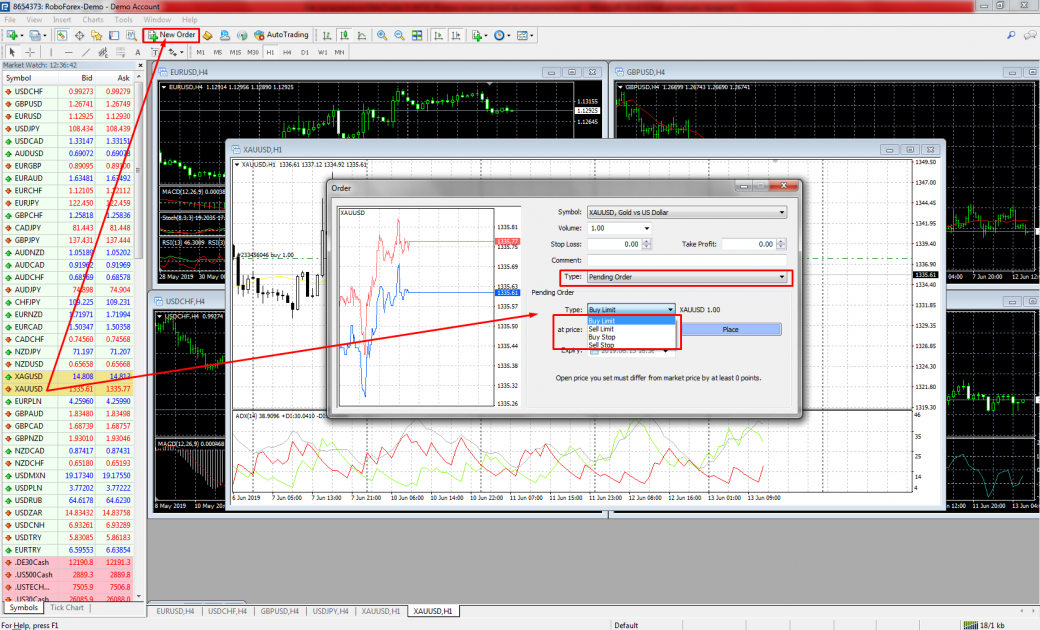
Orders to take profit and limit possible losses are in a separate group:
- Take Profit is an order to close a profitable position when the chosen financial instrument reaches the price specified in the order. In case of buying, Take Profit is placed above the current market price, while in case of selling – below it, and can be specified in market and pending orders when they are created. Take Profit orders can be created or modified by right-clicking the open order in “Trade” tab -> “Modify or delete order”.
- Stop Loss is an order to close a loss-making position when the chosen financial instrument reaches the price specified in the order. In case of buying, Stop Loss is placed below the current market price, while in case of selling – above it, and can be specified in market and pending orders when they are created. Stop Loss orders can be created or modified by right-clicking the open order in “Trade” tab -> “Modify or delete order”.
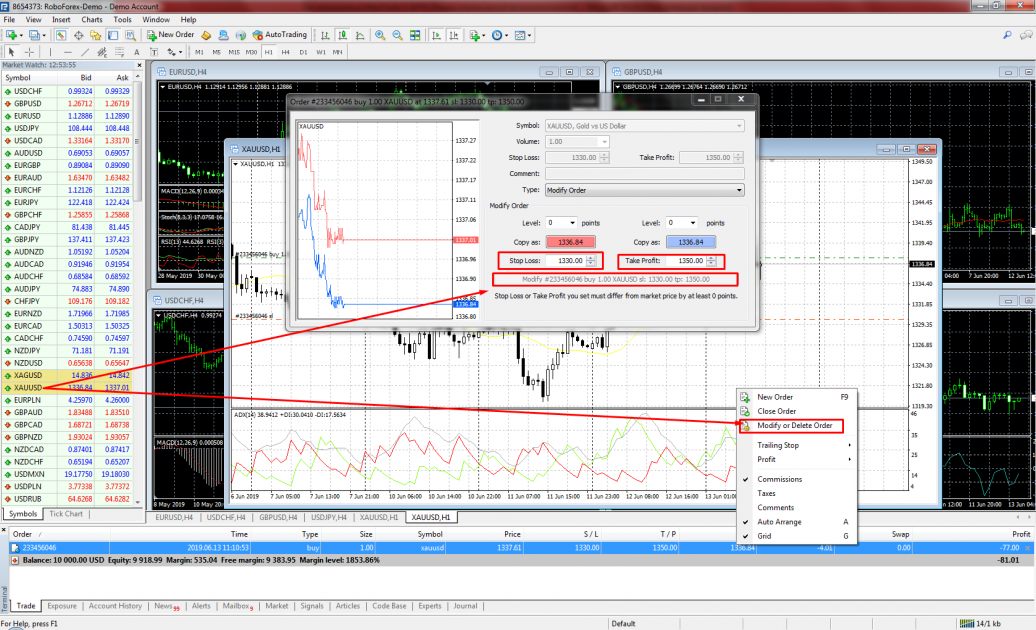
- Trailing Stop is a dynamic function similar to Stop Loss. In case of this order, the price specified in it follows the current market price in a profitable direction on the interval in points (point is the minimum unit of the price change). Trailing Stop helps to limit loss of profits in case of significant movements against an open position. It can be set by right-clicking an open order, choosing “Trailing stop”, and specifying the required interval in points.
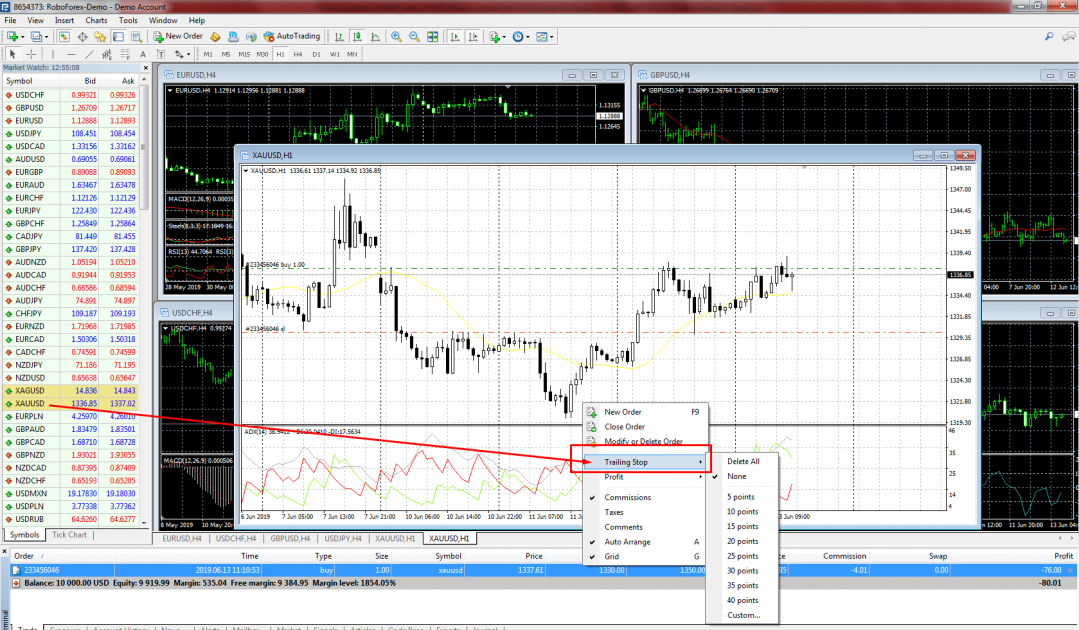
7. How to connect VPS to MetaTrader 4
The terminal is designed with an opportunity to connect a virtual trading server, VPS, which helps to provide stable and uninterrupted operations on trading accounts. EAs (robot) in MetaTrader 4 may perform their functions only if a PC with the terminal is running and has an active internet connection. If your PC gets stuck suddenly or loses server connectivity, EAs will stop working at once. In the best case scenario, one may lose some profit, but in the worst – incur significant losses of their own funds. Buying VPS, a remote virtual server may help to solve this problem. For a small fee, you will get access to a network server and copy your MetaTrader with all customized EAs 4 there. As a result, even in case of failures and malfunctions on your local PC, your EAs will continue operating steadily on this virtual recourse.
VPS is quite easy to install. Find the required account number in “Navigator” window, right-click it, and choose “Register a Virtual Server”. In the next window, you have to register and choose a fee. After connecting your trading account to a virtual server, your terminal data synchronization will be required. Upon the completion of this procedure, the copied terminal with all your settings will start operating on a remote VPS server. If necessary, a virtual hosting may be disabled at any moment.
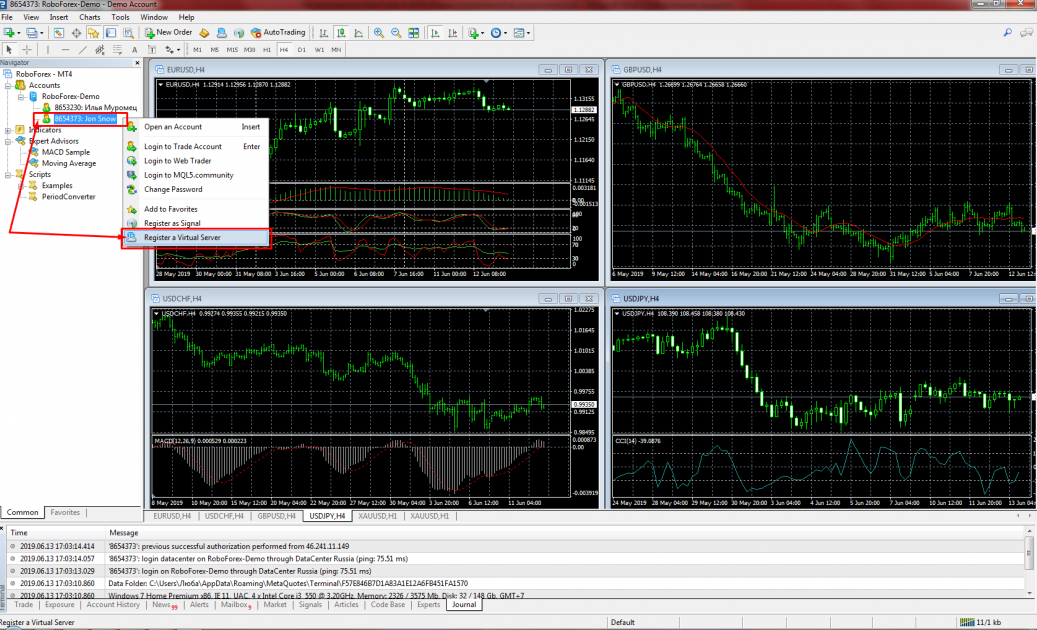
8. How to copy EAs to MetaTrader 4
Availability of MetaEditor, a built-in editor, in MT4, which is intended for programming in MQL4, allows to create and use trading advisors (Expert Advisors, or EAs). These are special programs with set algorithms for automated trading. All trading advisors in MetaTrader 4 are available in “Experts” folder. To add a new advisor to the terminal, go to “File” -> “Open Data Folder”. Then go to “MQL4” -> “Experts” and copy a new advisor there. The terminal requires reboot so that an advisor could be found in “Navigator” window.
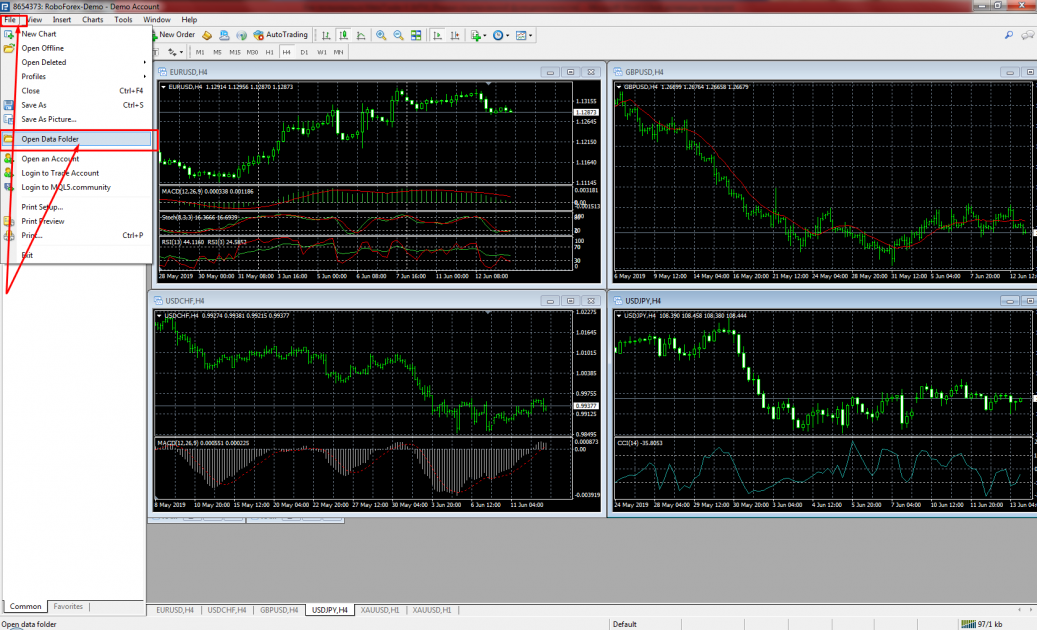
To run an advisor, you should check settings in “Tools” -> “Options” -> “Expert Advisors” (Ctrl+O):
- Allow automated trading. Tick this box to allow your advisors to operate. Here you can also find different options how to disable automated trading (in case of account, profile, chart symbol or period has been changed).
- Allow DLL imports allows EAs to use external DLLs in their operations.
- Allow WebRequest for listed URLs. This option allows EAs to exchange information only with recourses listed below.
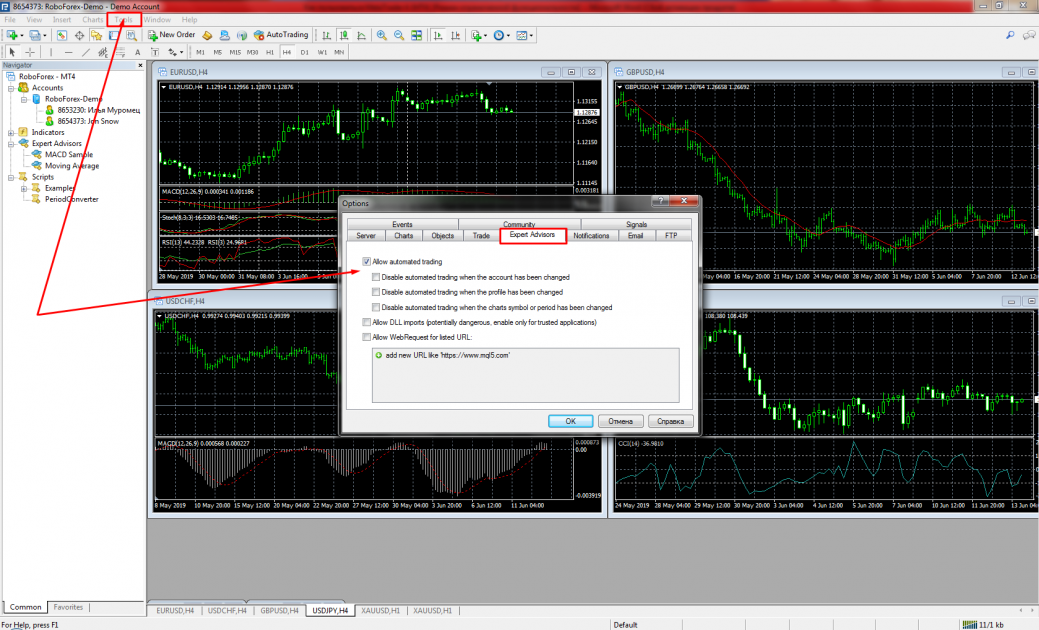
After customizing all basic parameters, an advisor has to be installed on the chart of the chosen financial instrument. To do this, drag an advisor by left-clicking it from “Navigator” window onto the chart. Then, you will see the window with this advisor’s settings. Specify all required parameters and click “OK”. Now, an advisor is ready for operation. A happy smile icon close an advisor’s name in the top right corner of the chart indicates that an advisor is enabled and working. In case of an unhappy emoticon, trading for this advisor is not allowed. Left-click on this emoticon will open the menu with settings where you can check its status in “Common” tab.
